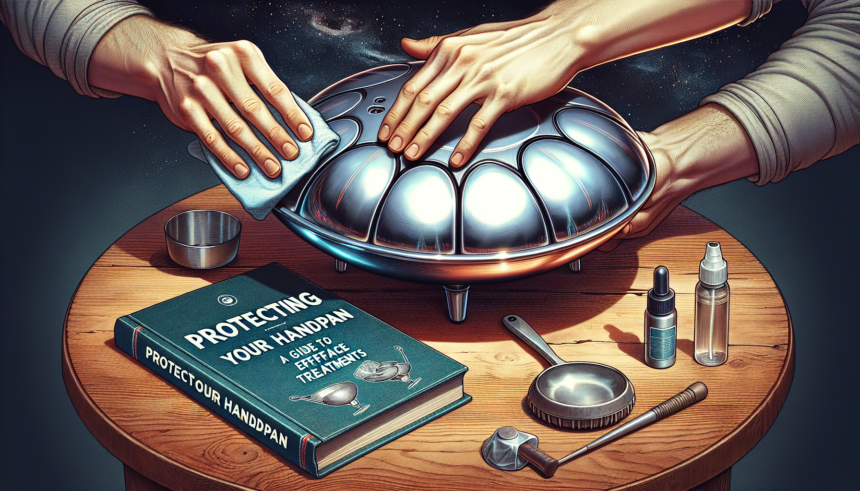The handpan is a beautiful and intricate musical instrument that demands careful maintenance to keep it in optimal condition. Given its unique sound and aesthetic, the handpan often becomes a prized possession for its owner. This article explores the various surface treatments available to protect your handpan, ensuring it remains in peak condition for years to come.
Understanding the Importance of Surface Treatments
Surface treatments are essential for safeguarding your handpan against environmental factors such as humidity, temperature changes, and physical damage. Without proper care, a handpan can suffer from corrosion, dents, and a deterioration of its sound quality. By implementing effective surface treatments, you can prolong the lifespan of your handpan while maintaining its pristine appearance and sound.
Types of Surface Treatments
There are several approaches to handpan surface treatments, each with its own set of benefits and application methods. Below, we explore the most common methods:
1. Oiling
One of the simplest and most effective ways to protect your handpan is by regularly applying oil. Oiling creates a thin protective layer that helps prevent rust and corrosion. Different types of oils can be used, such as:
- Mineral Oil: Often recommended due to its neutral smell and non-toxic properties.
- Camellia Oil: A traditional choice for tool protection, offering natural rust prevention.
- Lanolin-Based Oil: Known for its strong protective qualities and moisture resistance.
To apply oil, first clean the surface of the handpan with a soft cloth to remove any dirt or debris. Then, using a clean cloth, apply a thin layer of oil evenly across the surface. Allow the oil to sit for a few minutes before wiping off any excess with a dry cloth. This process should be repeated regularly, especially if you play your handpan frequently or live in a humid environment.
2. Waxing
Waxing is another effective surface treatment, often providing a longer-lasting protective layer compared to oils. Waxes can come in solid or liquid forms and are typically made from natural materials such as beeswax or carnauba wax.
To apply wax, you need to first clean the handpan as you would for oiling. Then, using a soft cloth, apply a small amount of wax to the surface and gently buff it in circular motions until it’s evenly distributed. Allow the wax to set for the recommended amount of time (usually listed on the product), and then buff the surface again to achieve a smooth, shiny finish. Waxing should be done less frequently than oiling, usually every few months.
3. Surface Coatings
For those looking for a more permanent solution, surface coatings can be applied. These coatings are usually professional-grade products that provide long-term protection by forming a hard, durable layer over the handpan. Some common types of surface coatings include:
- Ceramic Coatings: These offer excellent protection against rust, corrosion, and physical damage. They are often more expensive but provide long-lasting results.
- Polyurethane Coatings: These are tough, flexible, and resistant to moisture and chemicals.
Application of surface coatings generally requires more skill and experience, and it’s often recommended to have a professional apply them. Once coated, your handpan will need minimal maintenance aside from regular cleaning.
Preventive Measures and Best Practices
Beyond surface treatments, adopting preventive measures can further extend the life of your handpan. Here are some best practices:
1. Proper Handling and Storage
Always handle your handpan with care. Avoid dropping or bumping it against hard surfaces, which can cause dents and scratches. Store your handpan in a dedicated case when not in use to protect it from dust, moisture, and accidental damage.
Keep your handpan in a controlled environment. Extreme temperature fluctuations and high humidity levels can negatively affect the instrument. A room with consistent temperature and low humidity is ideal for storage.
2. Regular Cleaning
Regularly clean your handpan to remove fingerprints, dirt, and other residues that might contribute to rust and corrosion. Use a soft, lint-free cloth and avoid any abrasive materials. For deeper cleaning, you can use mild soapy water, but be sure to dry the instrument thoroughly afterward.
3. Avoiding Moisture
Moisture is one of the handpan’s worst enemies. Try to minimize exposure to water and damp environments. If your handpan gets wet, dry it immediately with a soft cloth and follow up with a light oiling or waxing.
Using Your Handpan with Care
Ensuring that you play the handpan correctly is crucial for maintaining its integrity. Play with clean hands to avoid transferring oils and dirt to the instrument. Additionally, use controlled techniques to avoid exerting excessive force that could damage the surface.
Conclusion
Maintaining a handpan requires a combination of regular surface treatments and preventive care. By understanding and implementing methods such as oiling, waxing, and applying surface coatings, you can effectively protect your handpan from corrosion and physical damage. Combine these treatments with proper handling and storage practices to ensure that your handpan remains a cherished musical instrument for years to come.
FAQs
1. How often should I oil my handpan?
The frequency of oiling depends on how often you play and the environment in which you store your handpan. Generally, it’s recommended to oil your handpan once a month if you play regularly or live in a humid area.
2. Can I use regular household oils for my handpan?
It’s best to use oils specifically recommended for handpan maintenance, such as mineral oil, camellia oil, or lanolin-based oil. Regular household oils might contain additives that can harm the surface of your handpan over time.
3. What should I do if my handpan gets wet?
If your handpan gets wet, immediately dry it with a soft cloth. Follow up with a light application of oil or wax to restore the protective layer. Avoid playing the handpan until it is thoroughly dried to prevent damage.
4. How can I prevent my handpan from rusting during travel?
When traveling, store your handpan in a hard case with a moisture-absorbing pack inside to reduce humidity. Regularly inspect and oil your handpan during extended travel periods to maintain its protective layer.
5. Can surface coatings change the sound of my handpan?
High-quality surface coatings are designed to maintain the acoustics of your handpan while providing protection. However, significant alterations or low-quality coatings could potentially affect the sound. Always choose reputable products and consider professional application for best results.





